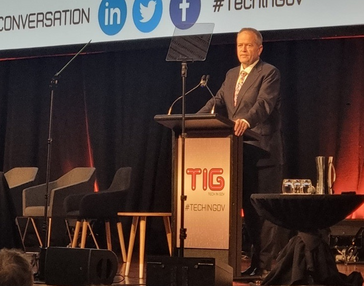Digital identity is on the way to becoming a reality, with 2.9 million people already having a digital ID, government services minister Bill Shorten says.

Mr Shorten provided an update on the figures in a keynote address on Tuesday to the Tech in Gov (TIG) Conference in Canberra, where he told delegates that Australians are embracing digital government as never before.
Digital ID provided the foundation for a secure cyber ecosystem, Mr Shorten said.
“Australia is on the cusp of having the Digital ID that will not only thwart the scammers and hackers, but provides the foundation for a robust, resilient, cohesive digital ecosystem that will protect our country and our community as we navigate the digital future,” he said.
“Just by low-cost encouragement … 2.9 million of the 25 million people who use myGov have a Digital ID.”
Mr Shorten said Finance Minister Katy Gallagher had previously flagged that a Digital ID could become a reality within 12 months.
“I fully support this ambition and am working to ensure my own portfolio is prepared,” he said.
myGov app downloads set to hit 3m
Meanwhile, Mr Shorten revealed that with 25 million myGov users – both online and via the myGov app – downloads of the app are set to hit 3 million within the next week.
He said the 2023 Australian Digital Citizen Report by digital transformation consulting company Publicis Sapient dispelled any doubt that the Australian public is embracing digital government.
As reported by Government News, the report found 94 per cent of Australians had used at least one digital government service in 2022, with 56 per cent of those surveyed saying they had used myGov in the past year.
MyGov services were also among the top three highest rated digital government services with a positive rating of 89 per cent.
“The research concluded that Australia’s digital government ambitions are heading in the right direction but better collaboration across tiers of government is crucial to understand the scope and quality of service delivery,” Mr Shorten said.
Beware over-reliance on policy wonks, big tech
But he warned that over-reliance on policy wonks and greedy vendors could lead to disaster, saying government needs to invest in tech expertise, as well as technology.

“In the public service, I feel the policy people have had an aura of superiority over those with the mechanics of implementation,” he said.
“If we don’t have people who speak the language… we can end up with our tech uptake being vendor-driven (and) big tech can hold government departments hostage to long contracts that build complexity into customer service.”
While Publicus Sapient found that concerns about the security of personal information were curbing enthusiasm about digital government services, Mr Shorten said recent scandals involving big consulting firms, along with the modernisation of government services, meant government was now more trusted than private industry.
However vulnerability to cyber criminals remained an ongoing concern, Mr Shorten said, and cyber security had evolved from being a niche technical field to a national security capability.
Australia’s first cyber security minister Clare O’Neil was currently overseeing the new Cyber Security Strategy, which among other things would consider ransom payments, supporting small business, and critical incident responses, Mr Shorten said.
He foreshadowed more announcements about the strategy in coming months.





Leave a Reply